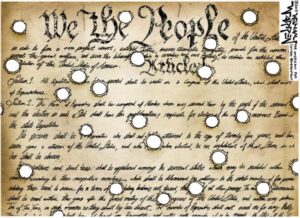While all eyes turn to Barack Obama’s annual State of the Union address, and what 2014 holds in store for the White House agenda, a better question might be how much of that agenda will even include Congress.
Yes, Congress, the institution he will be addressing per the Article 2, Section 3 power from the Constitution: “He shall from time to time give to the Congress information of the State of the Union, and recommend to their consideration such measures as he shall judge necessary and expedient.”
Yet, with Obama’s recent January 14 Cabinet meeting threat that “we are not just going to be waiting for a legislation” in order to act, one has to wonder if he will even be bothering with offering any recommendations at all.
After all, why even bother? He seems to have everything well in hand.
In announcing supposed reforms to the bulk collection of telephone records without probable cause on every single person in the U.S. by the National Security Agency (NSA) and the Federal Bureau of Investigation (FBI), Obama said, “I have instructed the intelligence community and the attorney general to use this transition period to develop options for a new approach that can match the capabilities and fill the gaps that the Section 215 program was designed to address, without the government holding this metadata itself. They will report back to me with options for alternative approaches before the program comes up for reauthorization on March 28.”
On the surface, that might sound like that there would be a role for Congress to reauthorize the same mass surveillance program that Obama says was authorized under Section 215 of the Patriot Act.
There’s just a small problem — the law that will not sunset until June 1, 2015. The March 28 “reauthorization” he was referring to was not to be made by Congress, but by the Foreign Intelligence Surveillance Court, which has been approving blanket surveillance of the entire country every 90 days for at least the past 12 years.
Besides that, it is dubious Congress ever authorized the mass data collection in the first place, a claim disputed both by the Patriot Act’s author, Rep. James Sensenbrenner (R-Wis.) and Obama’s own appointed so-called privacy board that found in its report that “the Section 215 bulk telephone records program is not sustainable from a legal or policy perspective…[as it] lacks a viable legal foundation under Section 215.”
To wit, the statute itself only provides for an “investigation of a United States person,” and requires there be a court order in every instance of an application made by under the section. This was a program created, not by Congress, but by the Department of Justice, the court, the FBI, and the NSA and subsequently slapped with a “Section 215” label.
And now, to supposedly fix the program, Obama will be turning to, not Congress, but the very same entities that crafted the dubious legal justification to begin with. Perhaps Obama will just leave that part out of his State of the Union speech all together.
On the Internal Revenue Service (IRS) targeting of the tea party and other 501(c)(4) organizations, Obama’s Department of Treasury in November issued a new regulation that will severely restrict the political speech of all (c)(4)s. This will be the most significant revision to (c)(4) rules in over 50 years, and yet Congress will have no role in authorizing the changes.
On Obamacare, the White House and other executive departments and agencies have instituted a series of delays that were never provided for under the health care law. These include postponing for a year the employer mandate on large firms to provide health coverage for their employees.
See a pattern? Who needs Congress when it’s simply more efficient and convenient for the executive branch to just act on its own?
One could go on and on — the Environmental Protection Agency’s carbon endangerment finding, the Federal Reserve’s $900 billion a year quantitative easing bank subsidy, etc. — but suffice to say, to make or amend a law or to appropriate money, constitutionally Congress has to act.
With the executive administrative state, what we’re seeing today is the erosion of the constitutional separation of powers that was supposed to safeguard against this sort of usurpation.
When that system breaks down, not only is the State of the Union weak — the fate of the Union may be in question. It is unclear whether the Constitution can ultimately survive such lawlessness.
Robert Romano is the senior editor of Americans for Limited Government







